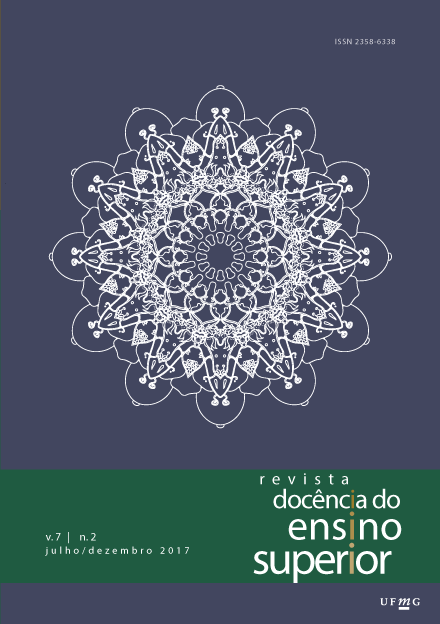As metodologias ativas e as aproximações entre o ensino e a aprendizagem na prática pedagógica universitária
DOI:
https://doi.org/10.35699/2237-5864.2017.2342Palabras clave:
Metodologias ativas, Docência universitária, EnsinoResumen
No contexto do desenvolvimento da prática pedagógica universitária, uma das preocupações dos professores refere-se ao encaminhamento metodológico dos processos de ensino e aprendizagem. Neste trabalho, propõe-se discutir sobre as possibilidades e os limites da prática pedagógica quando pautada na perspectiva da transmissão do conhecimento, por meio de aulas expositivas, em contraposição às propostas de ensino pela via das metodologias ativas. A metodologia adotada para o desenvolvimento do presente estudo é bibliográfica, orientada na leitura e análise de obras referentes ao tema proposto. Buscando apoio nas pesquisas de Nóvoa e Amante (2015), Mainardes (2008), Heacox (2006), Pozo (2002) e Roldão (2007), entre outros, o texto problematiza a dimensão didática da docência universitária, a fim de ressignificar e aproximar o ensinar do aprender. O estudo desenvolvido também evidenciou algumas possibilidades de encaminhamento metodológico na aula universitária, em situações didáticas planejadas em que se privilegia a perspectiva ativa dos estudantes em suas aprendizagens.
Descargas
Descargas
Publicado
Número
Sección
Licencia
Los autores que publican en esta revista conservan los derechos de autor y otorgan a la revista el derecho de primera publicación, siendo la obra licenciada simultáneamente bajo la Creative Commons Attribution License, que permite compartir la obra con reconocimiento de autoría y publicación inicial en esta revista.
Los autores están autorizados a asumir contratos adicionales por separado, para la distribución no exclusiva de la versión del trabajo publicado en esta revista (por ejemplo, publicación en un repositorio institucional o como capítulo de libro), con reconocimiento de autoría y publicación inicial en esta revista.
Política de acceso abierto:
La Revista Docência do Ensino Superior es una revista de Acceso Abierto, lo que significa que todo el contenido está disponible de forma gratuita, sin costo para el usuario o su institución. Los usuarios pueden leer, descargar, copiar, distribuir, imprimir, buscar o vincular a los textos completos de los artículos, o utilizarlos para cualquier otro propósito legal, sin necesidad de obtener el permiso previo del editor o autor, siempre que respeten la licencia de uso. los Creative Commons utilizados por la revista. Esta definición de acceso abierto está en línea con la Iniciativa de Acceso Abierto de Budapest (BOAI).



























